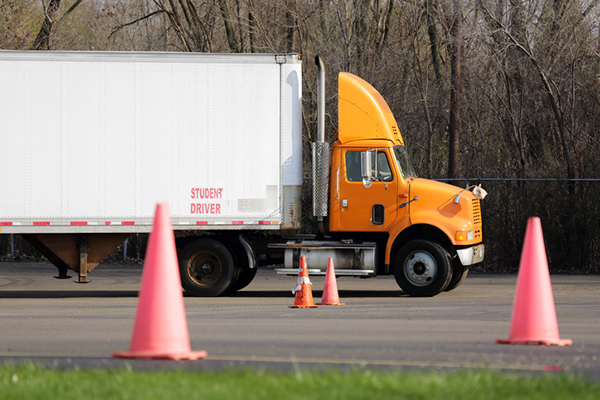Trucking companies breathing sigh of relief after Calif. judge issues injunction on AB5
Top trucking executives are breathing a sigh of relief after a California judge recently issued an injunction against Assembly Bill 5 (AB5), a law governing owner-operators that potentially could be very disruptive to trucking operations in the nation’s most populous state.
Truck drivers are divided on AB5, a California law that limits when workers can be contractors instead of employees. Some local port drayage operators supported the measure which would have limited owner-operators in that sector.
But top trucking officials said the proposed law – which essentially sought to reclassify owner-operators and those working in the “gig” economy has employees – would have been seriously disruptive to interstate commerce.
“It’s great,” David Heller, vice president of government affairs for the Truckload Carriers Association, said of the injunction issued by a California judge in mid-January. “As it stands now the independent contractor model, which the industry has used for decades, is still in full effect.”
That’s music to the hears of leading trucking company executives who say they would have been forced to cease operations in California because of the deleterious effects AB5 would have had on interstate commerce.
Jim Gattoni is president and CEO of Landstar, whose units did $4.08 billion in revenue last year – 45% of which was done by owner-operators and 47 percent by truck brokerage carriers.
“From a financial perspective it’s about half our revenue,” Gattoni told LM about the effect AB5 would have had on his operations. “We make sure we have an arm’s length relationship with our independent contractors. They haul what they want, when they want and where they want. And they’re very successful at it.”
Asked what would happen if California wins its appeal over the injunction, Gattoni said: “We can defend it. Then it goes to the attorneys.”
Gattoni said the proposed law was “a little disruptive internally” and that if the California proposal had become law, “Our business capacity owners (independent owner-operators) were going to have to operate outside the state of California.”
The TCA’s Heller said the California Trucking Association deserved credit for fighting AB5. “This is business practice that has been in the fold for decades,” he said. “I am very optimistic that is a fight that needs to be fought.”
He said because of volatility in demand levels, independent contractors and owner-operators provide “a much needed and viable demographic” that the industry always used to insulate itself from shipper volumes.
“For California to issue a rule that made that model obsolete was not good for anybody,” Heller told LM.
Besides California, what trucking industry officials feared most was more states trying to emulate the ruling. There were initiatives in New York and New Jersey that would have largely duplicated California’s limit on independent contractors in a range of industries.
“Interstate commerce prevails and you have to abide by one standard,” the TCA’s Heller said. “The trucking industry operates all over the country and needs one federal standard.”
U.S. District Judge Roger Benitez had first extended the temporary restraining order that blocked AB5 from being enforced for the trucking industry. The TRO later became an injunction, according to Judge Benitez.
AB5 was signed by Gov. Gavin Newsom Sept. 18 and was set to take effect Jan. 1. It sought to redefine what it means to be an employee in California by mandating that certain contract workers be classified as employees – including truck driver owner-operators both long haul and those independent drayage operators at the huge Ports of Long Beach and Los Angeles, the nation’s largest.
The California Trucking Association has led the charge against AB5, arguing that federal law governing interstate commerce pre-empts any state law. The CTA argued that AB5 is preempted by the Federal Aviation Administration Authorization Act (FAAAA) of 1994, and the judge agreed.
A federal judge temporarily blocked Assembly Bill 5 (AB5) enforcement for the trucking industry by granting a restraining order in a case filed by the California Trucking Association (CTA) Tuesday.
California state Assemblywoman Lorena Gonzalez, D-San Diego, introduced the bill that she said was meant to fight employee misclassification. But many independent owner-operators protested the legislation in recent weeks, asking for an exemption.
“This law is bad because we're going to be forced to be employees when we can grow as a small business,” Eduardo Rangel, a truck owner-operator, told KPIX in Los Angeles.
In another regulatory note, as expected, the Federal Motor Carrier Safety Administration (FMCSA) is amending its Dec. 8, 2016, final rule, “Minimum Training Requirements for Entry-Level Commercial Motor Vehicle Operators” (ELDT final rule), by extending the compliance date for the rule from Feb. 7, 2020, to Feb. 7, 2022.
FMCSA said this action was necessary in order to provide the agency with additional time to complete development of the Training Provider Registry (TPR).
The TPR will allow training providers to self-certify that they meet the training requirements and will provide the electronic interface that will receive and store entry-level driver training (ELDT) certification information from training providers and transmit that information to the State Driver Licensing Agencies.
FMCSA said the additional time would also provide SDLAs with time to modify their information technology (IT) systems and procedures, as necessary, to accommodate their receipt of driver-specific ELDT data from the TPR. And FMCSA added that it is delaying the entire ELDT final rule, as opposed to a partial delay as proposed, due to “delays in implementation of the TPR that were not foreseen” when the proposed rule was published more than three years ago.













